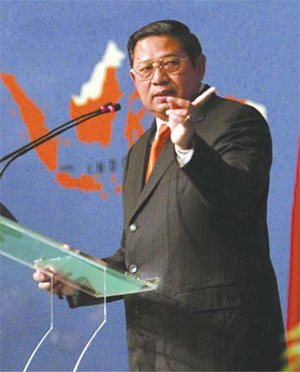Great expectations for Indonesia
 |
| President Susilo Bambang Yudhoyono |
Further deregulation of industries, development of free trade agreements, harmonizing of economic and trade policies, and strengthened industrial cooperation are important and positive milestones for Indonesia.
Yet, the government led by President Susilo Bambang Yudhoyono recognizes that more needs to be done, including simplifying the application for business licenses, lowering of tariffs, easing of joint venture and investment requirements, and enforcing stricter labor laws in what is a very promising market.
"Indonesia has a strategic location within easy reach of nearly 3 billion people in the Asia-Pacific region. The rapidly growing middle-class consumer market increasingly demands quality goods and services," pointed out Sofian Pane, president of the Jakarta Chamber of Commerce (Kadin).
"Indonesia wishes to recapture its earlier reputation as one of the brightest performers in East Asia. The government is focusing on improving investment climate, and with the country's rich natural resources, low labor wage structure and large domestic market of over 220 million people, Indonesia welcomes foreign investors," Pane added.
China and Indonesia
The economies of China and Indonesia exert an important influence in the Asian region. Indonesia's over 20 million ethnic Chinese comprise the largest such population outside of China.
The 17th largest trading partner of China, Indonesia imports Chinese goods such as mechanical equipment, electrical and electronic products, and textiles on a large scale. China, on the other hand, ranks fourth among Indonesia's trading partners, buying products such as pulp and palm oil products, petroleum oil and natural gas.
During the Indonesia-China Energy Forum held in Bali in 2002 and in Shanghai in 2006, government and business leaders from the two countries discussed future energy and trade opportunities. Event organizer Bimasena Energy Society plans to hold a third forum in the province of South Sumatra in 2008.
Meanwhile, Chinese enterprises are increasingly looking toward Indonesia as a favorable destination for investment in order to carry out their 'Going Global' strategy.
Statistics from the Chinese Ministry of Commerce reveal that Chinese companies completed $557 million worth of contracted projects and signed new contracts to the tune of $1.04 billion between January and November 2006.
In April 2005, the two countries signed a joint declaration to establish a strategic partnership.
In a measure that clearly indicates the mutual benefits that Indonesia and China can derive, the two governments also signed a "Partnership and Bilateral Cooperation on Trade, Investment, Infrastructure and Agriculture" the same year.
There are undoubtedly challenges ahead. However, the future looks positive for bilateral trade relations, as it has grown rapidly and steadily in recent years, reaching $19.06 billion in 2006.
"In line with China's opening-up policy, which is vital to the development of the country, Indonesia is following suit in order to boost foreign direct investment and reduce unemployment. In addition, Indonesian and Chinese relations have been improving year upon year," said Sukanta Tanudjaja, chairman of the Indonesian Chinese Entrepreneur Association
Future of Indonesia
Indonesia's national motto - unity in diversity - exemplifies the nation's need to come together while acknowledging its rich cultural history. While strengthening the economy remains a priority, there are other areas that need close attention to ensure economic progress for the archipelago nation.
Foreign investment relies on three key factors: security, rule of law, and an attractive business environment. Security is a key issue for foreign investors (in Indonesia) as transparency and anti-corruption legislation will lead to increased investor confidence.
The promise of a renascent Indonesia lies in the hands of its next generation of leaders, politicians and business people.
"Indonesia is changing radically. We have planted a seed of reform and will nurture our objectives in order to see them grow. The three most important issues facing the Indonesian economy today are interrelated: poverty, unemployment and infrastructure development," said Finance Minister Mulyani Indrawati.
"The progress we have made can be demonstrated by the reassurance and confidence we have in our aims to improve legislative predictability, transparency and communication between government and commerce. Below the surface, Indonesia has enormous potential and we expect great things for the future of our country," the minister added.
(China Daily 08/17/2007 page18)














